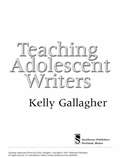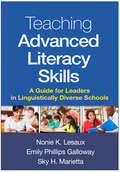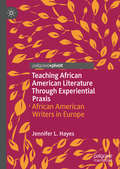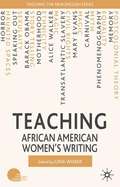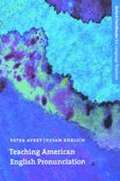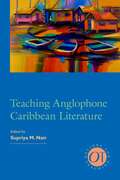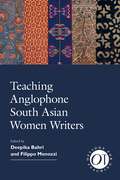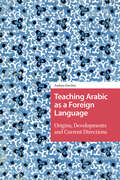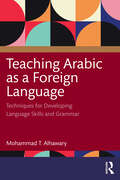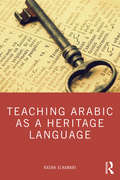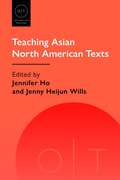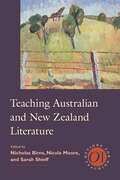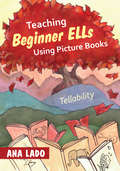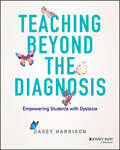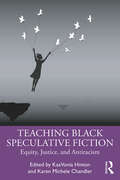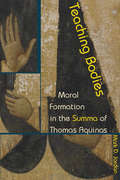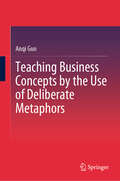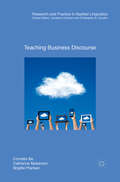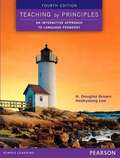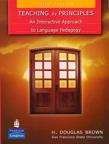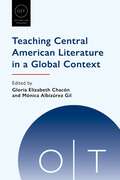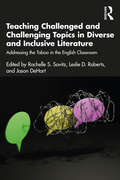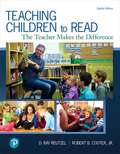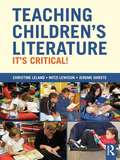- Table View
- List View
Teaching Adolescent Writers
by Kelly GallagherIn an increasingly demanding world of literacy, it has become critical that students know how to write effectively. From the requirements of standardized tests to those of the wired workplace, the ability to write well, once a luxury, has become a necessity. Many students are leaving school without the necessary writing practice and skills needed to compete in a complex and fast-moving Information Age. Unless we teach them how to run with it, they are in danger of being run over by a stampede—a literacy stampede. In Teaching Adolescent Writers, Kelly Gallagher, author of Reading Reasons and Deeper Reading, shows how students can be taught to write effectively. Kelly shares a number of classroom-tested strategies that enable teachers to: - understand the importance of teaching writing; - motivate young writers; - see the importance modeling plays in building young writers (modeling from both the teacher and from real-world text); - understand how providing choice elevates adolescent writing (and how to allow for choice within a rigorous curriculum); - help students recognize the importance of purpose and audience; - assess essays in ways that drive better writing performance. Infused with humor and illuminating anecdotes, Kelly draws on his classroom experiences and work as co-director of a regional writing project to offer teachers both practical ways to incorporate writing instruction into their day and compelling reasons to do so.
Teaching Advanced Literacy Skills: A Guide for Leaders in Linguistically Diverse Schools
by Sky H. Marietta Emily Phillips Galloway PhD Nonie K. LesauxIn our knowledge-based society, K-8 students need to develop increasingly sophisticated skills to read, write, and speak for a wide variety of purposes and audiences. Including an extended case example from a linguistically diverse school, this book guides school leaders to design and implement advanced literacy instruction through four key shifts: strengthening the instructional core, giving data a central role, using a shared curriculum, and providing supportive and tailored professional development. Reproducible forms and templates facilitate planning and implementation of schoolwide initiatives. Purchasers get access to a Web page where they can download and print the reproducible materials in a convenient 8 1/2" x 11" size.
Teaching African American Literature Through Experiential Praxis: African American Writers in Europe
by Jennifer L. HayesThis book focuses on teaching African American literature through experiential praxis. Specifically, the book presents several canonical African American literature authors in a study abroad context. The book chapters consider the historical implications of travel within the African American literature tradition including slave narratives, migration narratives, and expatriate narratives. The book foregrounds this tradition and includes activities, rhetorical prompts, and thematic discussion that support instruction.
Teaching African American Women's Writing
by Gina WiskerThe essays in Teaching African American Women's Writing provide reflections on issues, problems and pleasures raised by studying the texts. They will be of use to those teaching and studying African American women's writing in colleges, universities and adult education groups as well as teachers involved in teaching in schools to A level.
Teaching American English Pronunciation
by Susan Ehrlich Peter AveryUnlike books aimed at linguistics students or individual learners of English, Teaching American English Pronunciation specifically addresses the needs of ESL teachers. It provides the descriptive knowledge needed to teach pronunciation effectively. But it is also full of practical teaching ideas. The book is divided into three main parts: - Part One is an introduction to the English sound system. It covers spelling and pronunciation, the individual sounds of English, English sounds in context, the shape of English words, word stress and vowel reduction, and connected speech. Throughout this part of the book, the authors use examples of typical errors made by ESL students to illustrate the descriptions and concepts they describe. - Part Two describes the pronunciation problems that most ESL students have with English vowels, consonants, stress, rhythm, and intonation. It then goes on to look at the specific pronunciation problems of speakers of fifteen different languages: Arabic, Chinese, Farsi, French, German, Greek, Hindi and Punjabi, Italian, Japanese, Korean, Polish, Portuguese, Spanish, and Vietnamese. - Part Three consists of a set of articles about practical issues in pronunciation teaching. These are written by ten North American teachers and language researchers with a wide range of experience of teaching in many different contexts. The topics covered include: pronunciation syllabus design, pronunciation-based listening activities, developing self-correcting and self-monitoring strategies, and drama techniques in the pronunciation class.
Teaching Anglophone Caribbean Literature (Options for Teaching #34)
by Grant Farred Nicole N. Aljoe Giselle Liza Anatol Albert Braz Elaine Savory John C. Hawley Elizabeth Way Alisa K. Braithwaite Jennifer P. NesbittThis volume in the Options for Teaching series recognizes that the most challenging aspect of introducing students to anglophone Caribbean literature--the sheer variety of intellectual and artistic traditions in Western and non-Western cultures that relate to it--also offers the greatest opportunities to teachers. Courses on anglophone literature in the Caribbean can consider the region's specific histories and contexts even as they explore common issues: the legacies of slavery, colonialism, and colonial education; nationalism; exile and migration; identity and hybridity; class and racial conflict; gender and sexuality; religion and ritual. While considering how the availability of materials shapes syllabi, this volume recommends print, digital, and visual resources for teaching.The essays examine a host of topics, including the following: the development of multiethnic populations in the Caribbean and the role of various creole languages in the literatureoral art forms, such as dub poetry and reggae musicthe influence of anglophone literature in the Caribbean on literary movements outside it, such as the Harlem Renaissance and black British writingCarnivalreligious rituals and beliefsspecific genres such as slave narratives and autobiographyfilm and dramathe economics of rumMany essays list resources for further reading, and the volume concludes with a section of additional teaching resources.
Teaching Anglophone South Asian Women Writers (Options for Teaching #52)
by Edited by Deepika Bahri and Filippo MenozziGlobal and cosmopolitan since the late nineteenth century, anglophone South Asian women's writing has flourished in many genres and locations, encompassing diverse works linked by issues of language, geography, history, culture, gender, and literary tradition. Whether writing in the homeland or in the diaspora, authors offer representations of social struggle and inequality while articulating possibilities for resistance.In this volume experienced instructors attend to the style and aesthetics of the texts as well as provide necessary background for students. Essays address historical and political contexts, including colonialism, partition, migration, ecological concerns, and evolving gender roles, and consider both traditional and contemporary genres such as graphic novels, chick lit, and Instapoetry. Presenting ideas for courses in Asian studies, women's studies, postcolonial literature, and world literature, this book asks broadly what it means to study anglophone South Asian women's writing in the United States, in Asia, and around the world.
Teaching Arabic as a Foreign Language: Origins, Developments and Current Directions
by Andrea FacchinTeaching Arabic as a Foreign Language concentrates on the origins, developments and current directions of the discipline Teaching Arabic as a Foreign Language (TAFL) within the Arab world and partially outside of it during the last 60 years, namely between 1958 and 2018. Considered in this volume are the most influential scholars, authors, educators and those significant works that have contributed to the development of the discipline. In addition, special attention is paid to the TAFL institutes, regarded as epicenters of TAFL activities and important meetings, that allow scholars to gather around the same table and discuss approaches, trends and methods used in the field. All of these aspects converge in one comprehensive study which is enriched by a narration of the main sociopolitical changes that have affected the Middle East in latter-day history.
Teaching Arabic as a Foreign Language: Techniques for Developing Language Skills and Grammar
by Mohammad T. AlhawaryTeaching Arabic as a Foreign Language: Techniques for Developing Language Skills and Grammar is an indispensable guide for in-training and novice teachers of Arabic as a foreign language and a source of fresh and effective ideas for experienced teachers. This highly practical guide outlines how Arabic second-language skills (listening, speaking, reading, and writing) and grammar are targeted in isolation from one another and how they are integrated to reinforce each other through the use of specific tried-and-tested techniques and activities. Teaching Arabic as a Foreign Language provides instantly accessible, practical teaching techniques to target and develop specific language skills and grammar at novice, intermediate, and advanced levels.
Teaching Arabic as a Heritage Language
by Rasha ElHawariTeaching Arabic as a Heritage Language is a practical guide to Arabic pedagogy for Heritage Learners of Arabic. Exploring the teaching of Arabic as a foreign language (TAFL) in North America and Europe, it covers sociocultural topics such as diglossia and religion alongside theoretical approaches to Heritage Language Learning. It also provides a new and detailed definition of the heritage language learner (HLL) of Arabic. The role of the professor and the material are explored to ensure a successful learning experience. The latest advances in HLL are considered together with the recent and recommended changes in classroom practice, giving rise to the recognition of the individual needs of heritage learners. This is an indispensable resource for instructors, researchers, and students in the fields of TAFL and TASOL, as well as linguists interested in Arabic language learning and teaching.
Teaching Asian North American Texts (Options for Teaching #57)
by Jennifer Ho and Jenny Heijun WillsFrom the short stories and journalism of Sui Sin Far to Maxine Hong Kingston's pathbreaking The Woman Warrior to recent popular and critical successes such as Viet Thanh Nguyen's The Sympathizer, Mohsin Hamid's The Reluctant Fundamentalist, and Kevin Kwan's Crazy Rich Asians, Asian North American literature and media encompass a long history and a diverse variety of genres and aesthetic approaches.The essays in this volume provide context for understanding the history of Asian immigrants to the United States and Canada and the experiences of their children, grandchildren, and great-grandchildren. Contributors address historical contexts, from the early enactment of Asian exclusion laws to the xenophobia following 9/11, and provide tools for textual analysis. The essays explore conventionally literary texts, genres such as mystery and speculative fiction, historical documents and legal texts, and visual media including films, photography, and graphic novels, emphasizing the ways that creators have crossed boundaries of genre and produced innovative new forms.
Teaching Australian and New Zealand Literature (Options for Teaching #40)
by Nicholas Birns Nicole Moore Sarah ShieffAustralia and New Zealand, united geographically by their location in the South Pacific and linguistically by their English-speaking inhabitants, share the strong bond of hope for cultural diversity and social equality--one often challenged by history, starting with the appropriation of land from their Indigenous peoples. This volume explores significant themes and topics in Australian and New Zealand literature. In their introduction, the editors address both the commonalities and differences between the two nations' literatures by considering literary and historical contexts and by making nuanced connections between the global and the local. Contributors share their experiences teaching literature on the iconic landscape and ecological fragility; stories and perspectives of convicts, migrants, and refugees; and Maori and Aboriginal texts, which add much to the transnational turn.This volume presents a wide array of writers--such as Patrick White, Janet Frame, Katherine Mansfield, Frank Sargeson, Witi Ihimaera, Christina Stead, Allen Curnow, David Malouf, Les Murray, Nam Le, Miles Franklin, Kim Scott, and Sally Morgan--and offers pedagogical tools for teachers to consider issues that include colonial and racial violence, performance traditions, and the role of language and translation. Concluding with a list of resources, this volume serves to support new and experienced instructors alike.
Teaching Beginner ELLs Using Picture Books: Tellability
by Ana L. LadoPicture your beginning ELLs reading their way to success! For beginning ELLs, a picture really is worth a thousand words! Picture books are useful tools for building important language and social foundations that students may miss through traditional instruction. Ana Lado provides all the tools you’ll need to engage ELLs of any age with picture books, including how to: Design lessons around picture books Select appropriate titles using specific criteria Incorporate fun and engaging strategies like singing and reenacting Access the book’s searchable online database to find the right book Integrate picture-book learning to facilitate development of English Language Proficiency
Teaching Beyond the Diagnosis: Empowering Students with Dyslexia
by Casey HarrisonTips for tailoring instruction and meeting the needs of dyslexic learners Looking through both academic and social-emotional lenses, this book will deepen your understanding of dyslexia and help you feel confident in your interactions and implementation of instruction with your dyslexic learners. Written for educators and schools looking for ways to meet the social and emotional needs of dyslexic learners, scaffold instruction, and successfully implement accommodations, Teaching Beyond the Diagnosis provides a concrete framework for promoting self-confidence and student success. Author Casey Harrison, creator of The Dyslexia Classroom, shares her unique approach to creating dyslexia-friendly classrooms, providing accommodations and in the moment scaffolds as well as helping students build self-advocacy skills. This book will allow you to: Meet the needs of dyslexic learners both academically and emotionally Understand what dyslexia is, how it impacts learning, and what implications it has beyond the reading classroom Learn research-based techniques to enhance, differentiate and scaffold instruction, promoting learning in students with dyslexia Develop empathy and understanding, both in yourself and in the broader educational community, and promote inclusive classrooms This book is for anyone who wants to help students with dyslexia find self-confidence and success: K-12 educators, as well as parents, administrators, and aspiring teachers.
Teaching Bibliography, Textual Criticism and Book History
by Ann R. HawkinsOffers a variety of approaches to incorporating discussions of book history or print culture into graduate and undergraduate classrooms. This work considers the book as a literary, historical, cultural, and aesthetic object. These essays are of interest to university teachers incorporating textual studies and research methods into their courses.
Teaching Black Speculative Fiction: Equity, Justice, and Antiracism
by KaaVonia Hinton Karen Michele ChandlerTeaching Black Speculative Fiction: Equity, Justice, and Antiracism edited by KaaVonia Hinton and Karen Michele Chandler offers innovative approaches to teaching Black speculative fiction (e.g., science fiction, fantasy, horror) in ways that will inspire middle and high school students to think, talk, and write about issues of equity, justice, and antiracism. The book highlights texts by seminal authors such as Octavia E. Butler and influential and emerging authors, including Nnedi Okorafor, Kacen Callender, B. B. Alston, Tomi Adeyemi, and Bethany C. Morrow.Each chapter in Teaching Black Speculative Fiction: introduces a Black speculative text and its author, describes how the text engages with issues of equity, justice, and/or antiracism, explains and describes how one theory or approach helps elucidate the key text’s concern with equity, justice, and/or antiracism, and offers engaging teaching activities that encourage students to read the focal text; that facilitate exploration of the text and a theoretical lens or critical approach; and that guide students to consider ways to extend the focus on equity, justice, and/or antiracism to action in their own lives and communities.
Teaching Bodies: Moral Formation in the Summa of Thomas Aquinas
by Mark D. JordanIn Teaching Bodies, leading scholar of Christian thought Mark D. Jordan offers an original reading of the Summa of Theology of Thomas Aquinas. Reading backward, Jordan interprets the main parts of the Summa, starting from the conclusion, to reveal how Thomas teaches morals by directing attention to the way God teaches morals, namely through embodied scenes: the incarnation, the gospels, and the sacraments. It is Thomas’s confidence in bodily scenes of instruction that explains the often overlooked structure of the middle part of the Summa, which begins and ends with Christian revisions of classical exhortations of the human body as a pathway to the best human life. Among other things, Jordan argues, this explains Thomas’s interest in the stages of law and the limits of virtue as the engine of human life.Rather than offer a synthesis of Thomistic ethics, Jordan insists that we read Thomas as theology to discover the unification of Christian wisdom in a pattern of ongoing moral formation. Jordan supplements his close readings of the Summa with reflections on Thomas’s place in the history of Christian moral teaching—and thushis relevance for teaching and writing in the present. What remains a puzzle is why Thomas chose to stage this incarnational moral teaching within the then-new genres of university disputation—the genres we think of as “Scholastic.” Yet here again the structure of the Summa provides an answer. In Jordan’s deft analysis, Thomas’s minimalist refusal to tell a new story except by juxtaposing selections from inherited philosophical and theological traditions is his way of opening room for God’s continuing narration in the development of the human soul.The task of writing theology, as Thomas understands it, is to open a path through the inherited languages of classical thought so that divine pedagogy can have its effect on the reader. As such, the task of the Summa, in Mark Jordan’s hands, is a crucial and powerful way to articulate Christian morals today.
Teaching Business Concepts by the Use of Deliberate Metaphors
by Anqi GuoThis book discusses the underlying metaphors of some important business principles and terms and positive teaching effects from deliberately implanting those metaphors in business lessons. It introduces original metaphors creatively used in live webcast courses which introduce difficult economic concepts to netizens. The deliberate metaphor is considered to represent a new dimension of metaphor, the communicative dimension. The book explores the communicative effect of deliberate metaphors and proves its effectiveness in teaching difficult business concepts. This book explores different uses of deliberate metaphors designed to support the teaching of business concepts and discusses two teaching experiments done to explore their effectiveness. Results showed that a focused design using deliberate metaphors in the lectures improved test performance, while a scattered design using deliberate metaphors used in lectures significantly increased students’ interest in the lectures.
Teaching Business Discourse (Research And Practice In Applied Linguistics Ser.)
by Cornelia Ilie Catherine Nickerson Brigitte PlankenThis book presents research in business discourse and offers pedagogical approaches to teaching business discourse in both classroom and consultancy contexts that address the key issues of dealing with different types of learners, developing teaching materials and evaluation. Drawing on the authors’ extensive experience of researching business discourse from a variety of different perspectives including pragmatics, discourse analysis, rhetoric, and language for specific purposes, it demonstrates how these approaches may be applied to teaching. Each chapter includes a list of additional readings, together with a number of practical tasks designed to help readers apply the materials presented. Case studies are used throughout the book to illustrate the concepts, thus equipping readers with a set of research tools to extend their own understanding of how language and communication operate in business contexts, as well introducing them to a variety of research-based ideas that can be translated easily into a classroom setting. The book is cross-cultural in scope as it includes perspectives from a range of different contexts. It represents a significant advance in current literature and will provide a valuable resource for students and scholars of applied linguistics, business communication, and business discourse, in addition to teachers of Business English.
Teaching By Principles: An Interactive Approach to Language Pedagogy
by H. Brown Heekyeong LeeTeaching by Principles is a widely acclaimed methodology test used in language teacher education programs around the world. In this fourth edition, Dr. H. Douglas Brown and Dr. Heekyeong Lee offer a comprehensive survey of practical language teaching options firmly anchored in current research on second language acquisition and pedagogy. Features of the Fourth Edition A comprehensive update on current issues, new research findings, and innovative classroom teaching techniques, with additional and reworked chapters to reflect this information A description and analysis of new foundational principles, including: agency, identity, languaculture, communities of practice, embodied cognition, and self-regulation Pre-reading organizers at the beginning of each chapter Frquent statistics and pedagogical "tips" in each chapter Numerous "classroom connections" to stimulate practical applications of concepts and principles End-of-chapter group activities, discussion topics, and suggested additional readings A glossary of technical terminology
Teaching By Principles: An Interactive Approach to Language Pedagogy
by H. Douglas BrownThis third edition of Teaching by Principles features: new chapters on course design, technology and critical pedagogy to reflect current trends and advances in methodology prereading organizers at the beginning of each chapter updated, expanded references treatment of other recent "hot topics" of interest: corpus linguistics form-focused instruction multiple intelligences nonnative English-speaking teachers autonomy willingness to communicate alternatives in assessment reflective teaching Also by H. Douglas Brown: Principles of Language Learning and Teaching, Fifth Edition Language Assessment: Principles and Classroom Practices Strategies for Success: A Practical Guide to Learning English.
Teaching Central American Literature in a Global Context (Options for Teaching #58)
by Gloria Elizabeth Chacón Mónica Albizúrez GilCentral America has a long history as a site of cultural and political exchange, from Mayan and Nahua trade networks to the effects of Spanish imperialism, capitalism, and globalization. In Teaching Central American Literature in a Global Context, instructors will find practical, interdisciplinary, and innovative pedagogical approaches to the cultures of Central America that are adaptable to various fields of study. The essays map out classroom lessons that encourage students to relate writings and films to their own experience of global interconnectedness and to read critically the history that binds Central America to the United States, Mexico, and the Caribbean. In the context of debates about immigration and a growing Central American presence in the United States, this book provides vital resources about the region's cultural production and covers trends in Central American literary studies including Mayan and other Indigenous literatures, modernismo, Jewish and Afro-descendant literatures, nineteenth- and twentieth-century literature, and contemporary texts and films.This volume contains discussion of the following authors, filmmakers, and public figures: Humberto Ak'abal, María José Álvarez and Martha Clarissa Hernández, Dennis Ávila, Abner Benaim, Jayro Bustamante, Berta Cáceres, Isaac Esau Carrillo Can, Jennifer Cárcamo, Horacio Castellanos Moya, Quince Duncan, Jacinta Escudos, Regina José Galindo, Francisco Gavidia, Francisco Goldman, Enrique Gómez Carrillo, Gaspar Pedro González, Carlos "Cubena" Guillermo Wilson, Eduardo Halfon, Tatiana Huezo, Florence Jaugey, Hernán Jimenez, Óscar Martínez, Victor Montejo, Marisol Ceh Moo, Victor Perera, Archbishop Óscar Romero, José Coronel Urtecho, and Marcela Zamora.
Teaching Challenged and Challenging Topics in Diverse and Inclusive Literature: Addressing the Taboo in the English Classroom
by Jason DeHart Rachelle S. Savitz Leslie D. RobertsThis groundbreaking text provides practical, contextualized methods for teaching and discussing topics that are considered "taboo" in the classroom in ways that support students’ lived experiences. In times when teachers are scapegoated for adopting culturally sustaining teaching practices and are pressured to "whitewash" the curriculum, it becomes more challenging to create an environment where students and teachers can have conversations about complex, uncomfortable topics in the classroom. With contributions from scholars and K-12 teachers who have used young adult literature to engage with their students, chapters confront this issue and focus on themes such as multilingualism, culturally responsive teaching, dis/ability, racism, linguicism, and gender identity. Using approaches grounded in socioemotional learning, trauma-informed practices, and historical and racial literacy, this text explores the ways in which books with complicated themes can interact positively with students’ own lives and perspectives. Ideal for courses on ELA and literature instruction, this book provides a fresh set of perspectives and methods for approaching and engaging with difficult topics. As young adult literature that addresses difficult subjects is more liable to be considered "controversial" to teach, teachers will benefit from the additional guidance this volume provides, so that they can effectively reach the very students these themes address.
Teaching Children to Read: The Teacher Makes the Difference
by Robert Cooter D. ReutzelA research-based, practical, comprehensive guide to teaching literacy in K-8 classrooms In an era of rigorous standards, Teaching Children to Read provides the essential information and strategies pre-service and new teachers need to help their students develop into capable and confident readers. <p><p>The importance of the teacher’s role is emphasized in every chapter using seven pillars of effective reading instruction: Teacher Knowledge; Classroom Assessment; Evidence-Based Teaching Strategies; Response to Intervention (or Multi-Tiered Systems of Support); Motivation and Engagement; Technology and New Literacies; and Family and Community Connections. Filled with recommendations made by the Institute of Education Sciences’ What Works Clearinghouse and links to IRIS Center instructional modules (in Revel™), the 8th Edition provides the research-based tools and knowledge needed to plan and deliver up-to-date, effective reading instruction in today’s classrooms.
Teaching Children's Literature
by Christine Leland Mitzi Lewison Jerome HarsteThis groundbreaking text offers a fresh perspective on how to implement children's literature into and across the curriculum in ways that are both effective and purposeful. Honed over years of experience and reflection in classroom settings and rich with real examples of teachers implementing critical pedagogy, it invites multiple ways of engaging with literature that extend beyond the genre and elements approach and also addresses potential problems or issues that teachers may confront. The book is structured around three 'mantras' that build on each other: Enjoy; Dig deeper; Take action. The practical strategies for taking a critical approach focus on issues that impact children's lives, building from students' personal experiences and cultural knowledge to using language to question the everyday world, analyze popular culture and media, understand how power relationships are socially constructed, and consider actions that can be taken to promote social justice. This book teems with pedagogical purpose. It is smart, principled, and useful. Its freshness and currency will resonate with readers and inspire their teaching. A Companion Website (www.routledge.com/cw/leland) enriches and extends the text.
